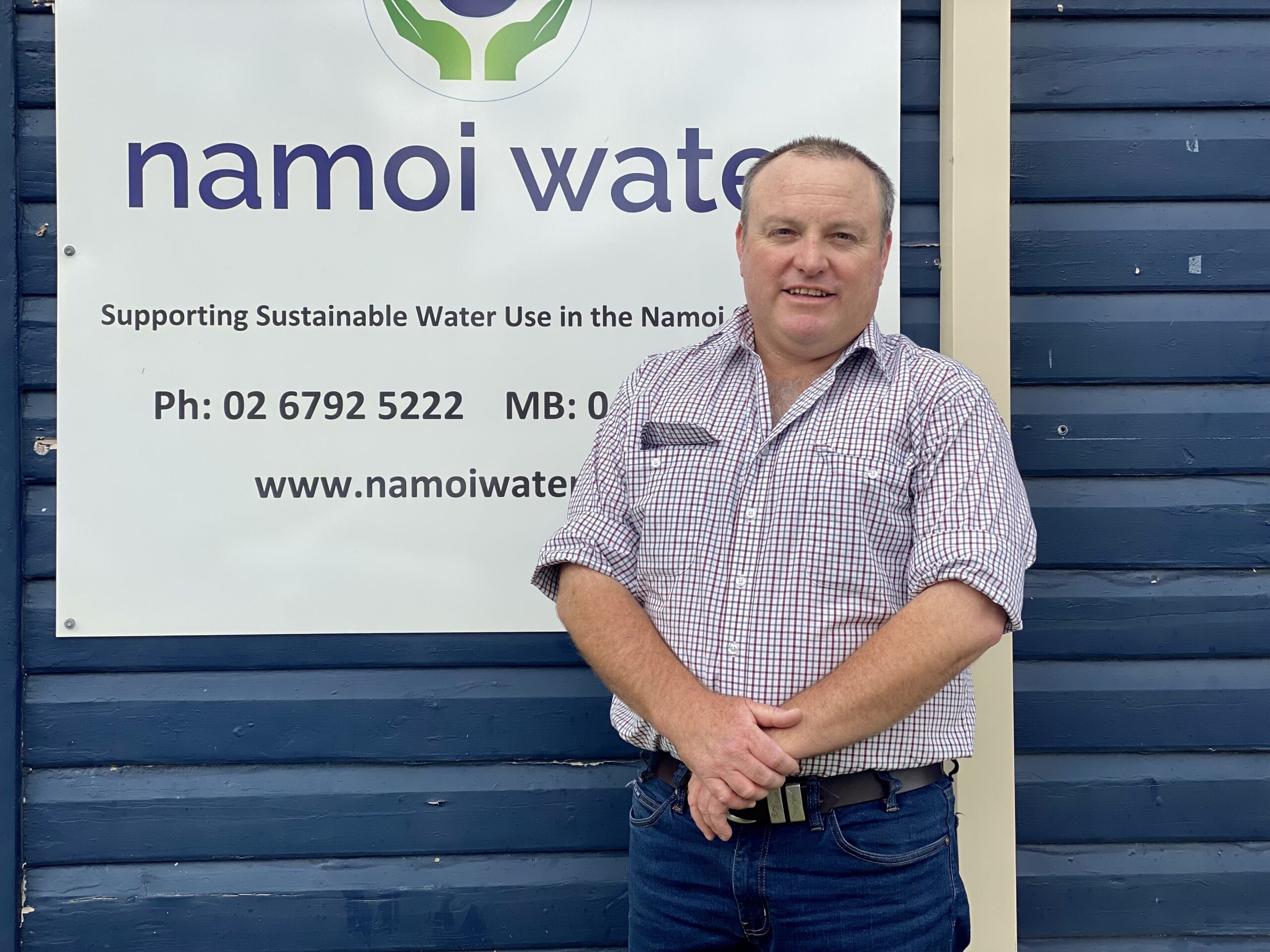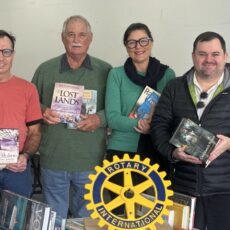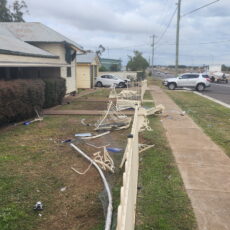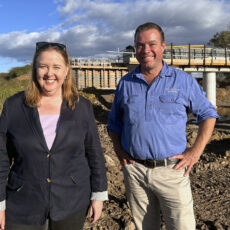On Tuesday, August 22, the announcement by Federal Water Minister Tanya Plibersek that the Commonwealth will attempt to recover 450 gigalitres (GL) of water for the environment by the end of 2027, and any water infrastructure projects currently not complete to be finished by 2026 was made.
This will include a move straight to buybacks of water entitlements in the pursuit of the Murray Darling Basin Plan, the news of which has both frustrated and angered Namoi Water executive officer Mick Coffey based in Narrabri.
“Buybacks don’t help communities – any individual has the right to sell their assets, that’s not the issue here.
“If someone wants out and gets a price they are happy with that can’t be achieved elsewhere that’s a decision that is theirs alone to make and good luck to them if they’re a willing seller.
“The issue is the lost productivity from that water leaving local production, which results in less money in the local economy, less employment and results in people leaving.
“The science is quite clear that extra water alone won’t achieve the outcomes the environment requires. How about putting the money towards things that are needed for the environment right now?
“Get on with addressing the key degradation drivers such as invasive species like carp, habitat degradation, lack of fish passageways, cold water pollution, and a need for more fish screens. This is where the bang for taxpayer buck will be measurable.”
As far as the Namoi Valley goes, according to the Murray Darling Basin Authority there is still 9.5 gigalitres of water recovery which must occur under the Bridging the Gap program.
NSW already operates under conditions which sees the Sustainable Diversion Limits (SDLs), which is the key intent of the basin plan, being complied with despite NSW Water Resource Plans not yet accredited.
This stage is 98 per cent completed, with the 450GL supposed to be a voluntary participation, based on neutral and positive socio-economic outcomes.
Currently as legislation stands the funding for the 450GL is tied to infrastructure projects but will require new legislation to de-couple from projects to facilitate buybacks, which Mr Coffey says, “is the laziest form of water recovery”.
It is expected based on comments by Ms Plibersek in recent days that further progression of the Strategic Water Purchasing Framework tenders will be seen in coming weeks.
The consultation around the tender process and the recent Productivity Commission road trip to discuss the basin plan implementation drew significant criticism from Mr Coffey.
“The federal government has said they have come and consulted with communities – what rubbish! They held a closed meeting here in March for a select few (less than 10) entitlement holders that had more bureaucrats than water users in the room about tendering water.
“It was an information download, not consultation. Then in July they had a meeting in Moree on the day final submissions were due to the productivity commission review of the implementation of the basin plan. None of that is consultation in my book.
“This is not a kick in the guts to local irrigators, it’s entire communities that will be hurt by this. Business owners and local government should be up in arms in a huge way – the sheer arrogance of a minister who has not once come to the Namoi, or spoken to people from our catchment, to grandstand and state her government will take the easy option just to make sure she holds face for the next election does not sit well.
“There’s already been one in three litres of irrigation water returned to the environment by the basin plan so far.
“The recent River Reflections conference held here in Narrabri by the Basin Authority demonstrated we are world leaders in water management.
“The basin plan can be achieved, without hurting communities, without impeding our nation’s ability to produce food and fibre and meet environmental objectives. Unfortunately, the federal Water Minister seems to have no ability to be a strong leader when required.”
When gaining a further understanding of how the water in the Murray Darling Basin system operates Mr Coffey emphasised the amount of misunderstanding and lack of knowledge about the impact irrigated agriculture has on the overall picture.
“Mainstream city media, and some organisations, individuals and political parties would have the public believe that every single of drop of water in the system is used by greedy, evil landholders who hoard every penny they make and never consider anything but themselves and seeing their bank balance rise while they drive around in expensive cars and take overseas first-class holidays at will.
“Only once they have used every possible drop do they let anything flow further downstream. This is the fallacy they would have people believe. In fact, the production farmers generate employ significant percentages of rural communities, both directly and indirectly.
“They contribute heavily towards local schools, hospitals, clubs and other community organisations and projects. They recognise the value of water and are acutely aware and conscious, more so than anyone else, it’s use must be sustainable for the future of all, not just themselves.
“They invest heavily to ensure water is used as efficiently as possible, to maximise the amount of production from the resource.
“To paint a picture, 28 per cent of all the water in the basin currently is diverted to town water, agriculture, and other industries, for example mining.
“The remaining volume, the lion’s share, is 72 per cent which all goes to the environment. This ratio is well within international standards.
“The unfounded demonising of rural irrigation communities needs to stop. It shows ignorance and immaturity by those who do so.”
The basin plan works in conjunction with the basin states (Queensland, NSW, Victoria and South Australia) and the ACT, however, the Victorian state Labor government has not signed up to the new plan which includes more options and funding to deliver the remaining water, which as mentioned includes buybacks of entitlements.
“Just how the basin plan can be delivered without one of the key States in agreeance remains unclear at this point in time,” Mr Coffey said.
“The NSW state Labor government has weighed into the debate by voicing its stance on opposing water buybacks and urging the Commonwealth to prioritise other methods of delivering the plan. Hats off to NSW Water Minister Rose Jackson, she’s pushed back at the federal government and stated that NSW does not support buybacks, but the fresh agreement hopefully will allow flexibility and provide time for key water infrastructure projects in our state to be completed.
“However, Ms Jackson needs to stay strong on sticking up for NSW,” said Mr Coffey.
The indication given by Ms Plibersek is that the legislative changes required for the new plan will be implemented sooner rather than later.
“The long and the short of it is the basin plan so far has seen one third of the productive water used to feed and clothe people removed. These people want to blindly push ahead and reduce this ability even more, without achieving the outcomes they say the water is needed for.
“I’m assuming they’re expecting naked and hungry people will want to vote for them. The people of the Namoi would love for any politician who will have a say in this process to come and stand in our main streets, stand in our paddocks and see and hear what their actions will mean to us if they don’t consider how to deliver the plan in a manner that doesn’t cripple communities. Grocery bills are currently one of the main concerns for households, it’ll only continue to get worse on this trajectory.”
With federal Senator David Pocock spending several days in the region last week, Mr Coffey was disappointed to not have been granted a meeting with the Senator, in light of the basin plan announcements.
“He is aware we are keen to meet, we went through the correct channels and I know other political figures strongly recommend he meet with me but he has chosen not to,” Mr Coffey said.
“Extremely disappointing given he was here in person, in a community that has so much to lose regarding an issue he will have huge influence on. I again, on the public record, request Senator Pocock spend time talking to all stakeholders in the basin and this includes Namoi Water. Namoi Water has a good, powerful reputation in Canberra, otherwise politicians wouldn’t endorse us to him. Even 10 minutes would’ve been good.”
Mr Coffey stated that Namoi Water will continue to advocate and lobby for the communities of the Namoi Valley, not just irrigators. He is insistent the circumstances call for a united front from all within the catchment.
“There’s not a person in the Namoi who isn’t affected daily by what irrigated agriculture does, be it large or tiny. Every megalitre of water which leaves our local economy hurts every one of us. Local councils, local businesses and individuals should feel insulted and angry – Namoi Water will keep pushing for everyone.”
To order photos from this page click here










